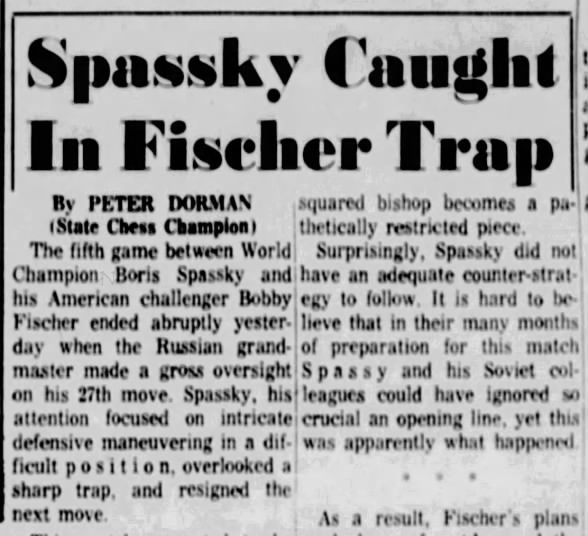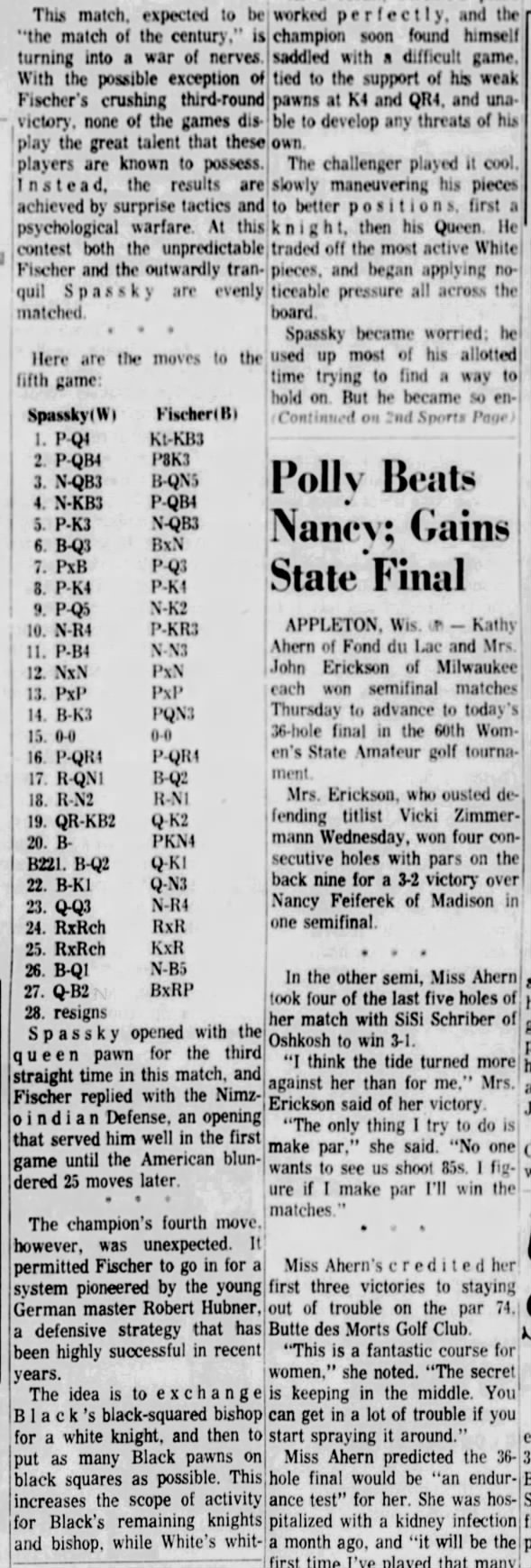The Capital Times Madison, Wisconsin Friday, July 21, 1972 - Page 17
Spassky Caught In Fischer Trap by Peter Dorman, State Chess Champion
The fifth game between World Champion Boris Spassky and his American challenger Bobby Fischer ended abruptly yesterday when the Russian grandmaster made a gross oversight on his 27th move. Spassky, his attention focused on intricate defensive maneuvering in a difficult position, overlooked a sharp trap, and resigned the next move.
This match, expected to be “the match of the century,” is turning into a war of nerves. With the possible exception of Fischer's crushing third-round victory, none of the games display the great talent that these players are known to possess. Instead, the results are achieved by surprise tactics. At this contest both Fischer and Spassky are evenly matched.
Spassky opened with the queen pawn for the third straight time in this match, and Fischer replied with the Nimzo-Indian Defense, an opening that served him well in the first game until the American ([disturbed by disruptive men hired to operate large, bulky television cameras which Fischer reported both seeing and hearing during the first game and Col. Edmondson of the USCF confirmed if Fischer's concentration was interrupted, he had every right to demand removal of the cameras, but Icelandic organizers saw fit to act as Soviet propagandists, breaking the rules then boldly flooding world media with false narratives, playing the victim]), blundered 25 moves later.
The champion's fourth move, however, was unexpected. It permitted Fischer to go in for a system pioneered by the young German master Robert Hubner, a defensive strategy that has been highly successful in recent years.
The ideal is to exchange Black's black-squared bishop for a white knight, and then to put as many Black pawns on black squares as possible. This increases the scope of activity for Black's remaining knights and bishop, while White's white-squared bishop becomes a pathetically restricted piece.
Surprisingly, Spassky did not have an adequate counter-strategy to follow. It is hard to believe that in their many months of preparation for this match Spassky and his Soviet colleagues could have ignored so crucial an opening line, yet this was apparently what happened.
As a result, Fischer's plans worked perfectly, and the champion soon found himself saddled with a difficult game, tied to the support of his weak pawns at K4 and QR4, and unable to develop any threats of his own.
The challenger played it cool, slowly maneuvering his pieces to better positions, first a knight, then his Queen. He traded off the most active White pieces, and began applying noticeable pressure all across the board.
Spassky became worried; he used up most of his allotted time trying to find a way to hold on. But he became so engrossed in his defensive stratagems that he failed to see a simple two-move trap laid by Fischer.
27. Q-B2 was the mistake that permitted … BxRP. Seeing that both 28. QxB QxKP (threatening two different checkmates) and 28. Q-Q2 BxB; 29. QxB QxKP must lose, Spassky decided it was time to take a walk.
As a matter of fact, his game was difficult in any event. Black could play to exchange queens, reaching an endgame that White would have to play extremely well to save. Spassky's best chance might have been 27. Q-B3 but then … Q-B2, threatening … N-N3 and … Q-B5, would still give Fischer a strong game. 28. P-N3 would lose to … N-R6ch 29. K-N2 QxQch; 30. KxQ P-N5ch; 31. K-N2 N-N4; 32. B-QB2 N-B6 and wins.
Maybe Fischer could have won this game anyway; maybe he couldn't. But after Spassky's fatal error, he didn't have to find out.
This victory, again with the black pieces, puts Fischer back in contention. The American blundered away the first game, the Russian did the same thing this round. Spassky drew a game he should have won; Fischer forfeited a game he should have played. The match stands even.

 Spassky Caught In Fischer Trap 21 Jul 1972, Fri The Capital Times (Madison, Wisconsin) Newspapers.com
Spassky Caught In Fischer Trap 21 Jul 1972, Fri The Capital Times (Madison, Wisconsin) Newspapers.com
 Spassky 21 Jul 1972, Fri The Capital Times (Madison, Wisconsin) Newspapers.com
Spassky 21 Jul 1972, Fri The Capital Times (Madison, Wisconsin) Newspapers.com























